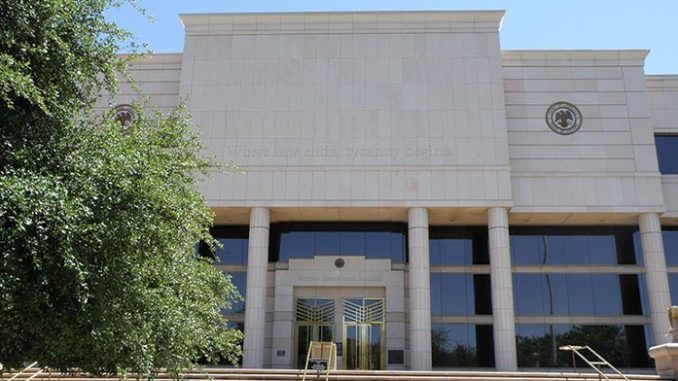
The Arizona Supreme Court heard oral arguments Tuesday in a case which could clarify the options available when a municipal clerk accepts an application for a referendum action despite knowing a required document is missing, as happened last year in the City of Surprise where more than 5,400 signatures were later rejected by the same Clerk.
On Aug. 16, 2022, the Surprise City Council adopted Ordinance 2022-18 which approved a Preliminary Development Plan and established residential density for 46 acres of land known as Truman Ranch Marketplace.
Two days later, a representative of Voice of Surprise (VOS) contacted Surprise City Clerk Sherry Aguilar to begin the process of referring the matter to voters in hopes of voiding the ordinance at the next general election.
It is undisputed that Clerk Aguilar provided VOS with an application to obtain a serial number for a referendum petition. It is also undisputed that in the upper lefthand corner of the application is a statement which reads, “Attached hereto is the full text, in no less than eight-point type, of the measure intended to be initiated or referred at the next general election.”
Later that month, a VOS representative went to city hall to submit the completed application. The Clerk then issued VOS a serial number, which is required before anyone can circulate its referendum petition.
But there was no copy of the “full text” of the Ordinance attached to the application. And as was later revealed, the Clerk knew the copy was missing and even knew the VOS representative had a copy of the Ordinance in their possession during their meeting.
If the Surprise City Clerk had refused to accept the not legally sufficient application that day, VOS could have added the missing copy and refiled. Instead, the 409 petition sheets with 5,432 signatures which VOS filed three weeks later ended up being rejected because the application lacked the attached copy of the Ordinance being referred to voters.
VOS and its chairperson Quintus Schulzke sued Surprise city officials on Oct. 7 in Maricopa County Superior Court seeking to compel the City Clerk to proceed with random signature sampling. Those sued by in their official capacities are Aguilar, Mayor Skip Hall, and the city council.
Also named as defendants are Truman Ranch 46 SWC LLC and Dominium, Inc. which have an interest in the property addressed in the Ordinance.
The lawsuit argued that VOS relied in good faith on the issuance of the serial number needed to begin circulating petitions. There was also no evidence that those signing the petitions had been defrauded or misled in any way, as a copy of the Ordinance in question was attached to each petition sheet as also required by state law.
A Maricopa County judge dismissed the VOS lawsuit, citing the group’s failure to submit a copy of the ordinance with its referendum application. The judge also noted state law requires “strict compliance” with all statutory requirements for the referendum process.
The Arizona Court of Appeals agreed with the trial court judge, adding that requiring the copy of the Ordinance to be attached makes clear what is being challenged, as a referendum petition could involve only a part or parts of the Ordinance.
The court appellate added that the Clerk’s failure to inform VOS of the application defect did not excuse VOS’s failure.
VOS and Schulzke petitioned the Arizona Supreme Court to review the case, resulting in Tuesday’s oral arguments. An amicus brief supporting VOS’s position was also filed with the Court by The Arizona Center for Law in the Public Interest is a nonpartisan, nonprofit law firm dedicated to defending the civil and legal rights of Arizonans.
Jennifer Wright, former head of the Elections Integrity Unit under Attorney General Mark Brnovich, argued the case on behalf of VOS. She told the justices that the Clerk should not have accepted application she knew did not comply with all the statutory requirements.
Wright also touched on the concern that one Clerk somewhere could advise a person or group upfront of an application defect while another Clerk could, for some reason, wait until the petitions are in to derail the referendum process.
Arguing against VOS’s appeal was Cameron Artigue, an attorney for Dominium Inc. He noted that one reason for requiring the Ordinance copy to be attached to the application was to “make a public record” of exactly what VOS was seeking to refer to the ballot.
This allows anyone to easily compare the application copy with the copy attached to each petition to ensure they matched, Artigue explained.
Ellen Van Riper, an attorneys for the city, argued the Clerk had no authority under the law to reject the VOS application even though she knew a required element was missing.
This prompted a question from Vice Chief Judge Ann Timmer, who asked what statute provided authority for the Clerk to reject petitions long after a serial number was assigned based on a deficient application.
According to Van Riper, that authority was based on the statutory requirement that a referendum effort comply with the entirety of the state’s referendum laws.
“They had the obligation to do it right,” she said of VOS.
The Arizona Supreme Court will issue an opinion later this year.
Watch the Arizona Supreme Court oral arguments https://supremestateaz.granicus.com/player/clip/3449?view_id=11&redirect=true&h=5c958607cb692c05948c4b57f62cb9f0
